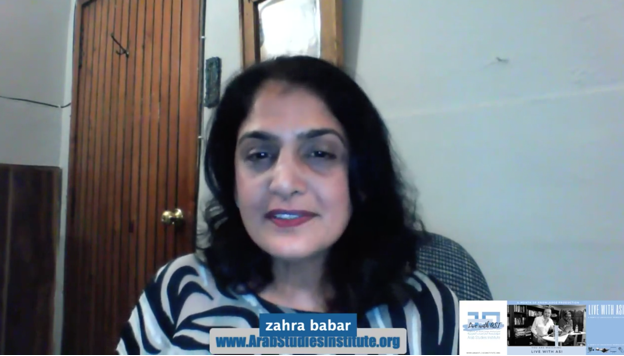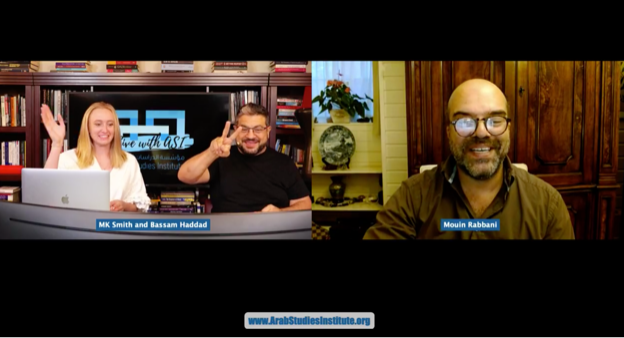Live with ASI is a monthly broadcast program that showcases recently published content from the Arab Studies Institute’s various branches. This content includes articles, reviews, pedagogical resources, podcasts, and more. Also featured in the broadcast are brand new interviews and discussions with authors and contributors
This month’s episode of Live with ASI covered two months of knowledge production within ASI, its various branches and partners. In Episode 2.3, co-hosts Bassam Haddad and MK Smith discussed pedagogy, highlighted a number of engaging podcasts and interviews, spoke with a number of ASI’s close partners, and announced a new podcast by the Knowledge Production Project.
This episode featured exclusive live interviews with an exciting set of scholars, including Zahra Babar, Lisa Wedeen, Benon Sevon, Carly A. Krakow, Huma Gupta, Mouin Rabbani, Rochelle Davis, Mouin Rabbani, Peter Mandaville, Amaney Jamal, and Adel Iskandar.
Ten Years On Project: Recap and Looking Forward (4:07)
Zahra Babar, Associate Director for Research at Center for International and Regional Studies (CIRS) at Georgetown University in Qatar, joins the show live from across the globe.
We are now nine months into the collaborative year-long project, Ten Years On: Mass Protests and Uprisings in the Arab World. The Ten Years On project brings together seventeen of our partners to produce resources for educators, researchers, students, and journalists to more critically understand the Arab Uprisings, and their various dimensions, over the past decade.
The project has put on over twelve panels and events, with discussions ranging from regional dynamics, Islamism, gender, art, and media. The next Ten Years On signature Event “Activism in Exile: Diasporic Communities in the Wake of the Arab Uprisings,” will be held on September 30th, and is co-organized by the Center for International and Regional Studies (CIRS) at Georgetown University in Qatar. Associate Director of CIRS, Zahra Babar, joined the show live to speak about the upcoming panel.
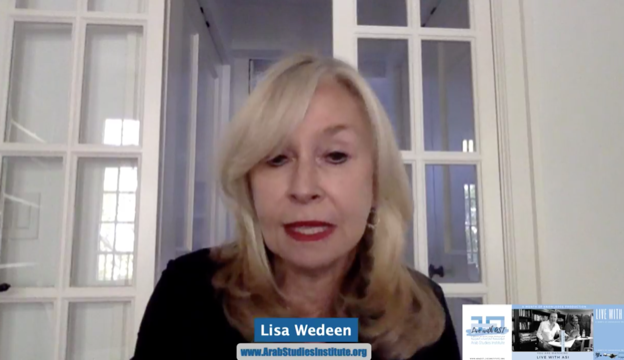
Lisa Wedeen speaks about the intellectual contributions of the Ten Years On project thus far, including its consideration of how to revamp approaches to knowledge production and creative thinking.
Lisa Wedeen, Mary R. Morton Professor of Political Science and the College and Co-Director of the Chicago Center for Contemporary Theory at the University of Chicago, also joined the show live to discuss the contributions of the Ten Years On project. Among her reflections on the importance of the project, Wedeen pointed to the ongoing debate around marking the ten-year anniversary in ways that remain true to the ongoing struggle and profound disappointments of the Arab Uprisings.
- Ten Years On Project
- LIVE EVENT - Ten Years On Project Signature Event: Activism in Exile (30 September)
Afghanistan (18:45)
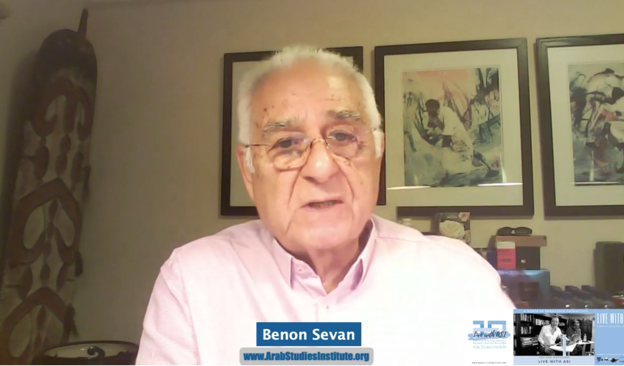
Benon Sevon reflects on the potential regional implications of the American withdrawal from Afghanistan.
Last month, Jadaliyya Co-Editor Mouin Rabbani spoke with former United Nations Under-Secretary-General Benon Sevan, who served as UNenvoy to Afghanistan and Pakistan from 1988–1992, about current developments in Afghanistan. During the podcast episode, Rabbani and Sevon examined the withdrawal of US and NATO forces from Afghanistan and the collapse of the government in Kabul, as well as how it compares with the Soviet withdrawal in 1989 and its aftermath. Sevon joined LWA Episode 2.3 live to discuss these issues further. [13]
The Catch-Up with Carly (25:53)
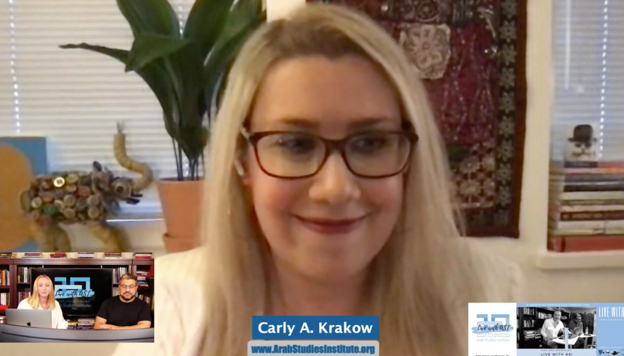
Carly A. Krakow joined live for her monthly current affairs segment, The Catch-Up.
Carly A. Krakow spoke with Bassam and MK to share updates from two recent broadcast interviews she conducted that aired over the summer. The first was with Afrah Nasser, Independent Press Freedom Award-winning journalist and Human Rights Watch Yemen Researcher. The second was with Palestinian filmmaker Hind Shoufani, co-writer and editor for Oscar-nominated and BAFTA-winning Palestinian film “The Present.”
Both are available to watch now through the links below!
- Yemen: Beyond Breaking News – Afrah Nasser in Conversation with Carly A. Krakow (Video)
- Palestinian Cinema: Memory, Poetry, Politics [Hind Shoufani in Conversation with Carly A. Krakow] (Video)
Environment in Context (29:37)
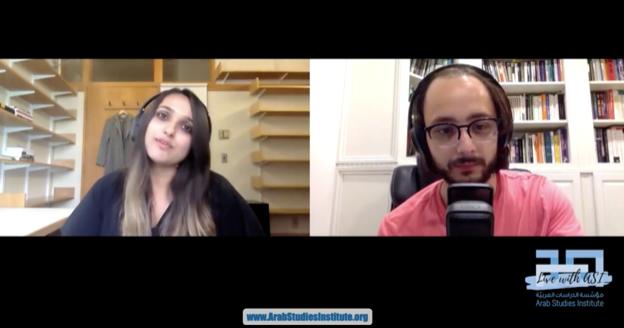
LWA Producer Mohammad Abou-Ghazala spoke with Huma Gupta for an inside look at the key takeaways from the new special episode of the Environment in Context podcast.
In August, the Environment in Context podcast series held a special episode, titled “Red, Green, and International: Abolition Geographies and Environmental Movements.” In the podcast episode, host Huma Gupta and China Sajadian, a doctoral candidate in the Department of Anthropology at the CUNY Graduate Center, discussed abolition geographies and environmental movements with renowned geographer and activist Ruth Wilson Gilmore, who teaches in Earth and Environmental Sciences, and directs the Center for Place, Culture, and Politics, at the City University of New York (CUNY) Graduate Center.
Connections Podcast (35:46)
Jadaliyya Co-Editor Mouin Rabbani shared some of the recent highlights for his podcast, Connections.
Over the last year, Jadaliyya Co-Editor Mouin Rabbani has excelled at a new endeavor: podcasting. Connections offers timely and informative interviews on current events and broader policy questions related to the Middle East. The audiovisual podcast combines journalism, analysis, and scholarship. With thirteen fascinating episodes out now, each featuring thought provoking conversations with key players in the latest policy and knowledge production conversations. Mouin Rabbani joined the show to discuss highlights from the six Connections episodes published over the past two months.
- Connections Episode 13: Asylum in the USA (Video)
- Connections Episode 12: Focus Afghanistan with Benon Sevan (Video)
- Connections Episode 11: A Planet in the Balance with Jeffrey D. Sachs (Video)
- Connections Episode 10: Crisis in Tunisia with Houda Mzioudet (Video)
- Connections Podcast Episode 9: Lebanon in Crisis with Nadya Sbaiti (Video)
- Connections Podcast Episode 8: Europe and the Arab-Israeli Conflict with Anders Persson and Diana Buttu (Video)
Pedagogy (38:34)
The Middle East Studies Pedagogy Initiative (MESPI) recently released two “Essential Readings” (ERs). To create ERs, MESPI invites scholars to submit foundational and diverse reading lists on topics pertinent to their research. This summer Sardar Saadi put together an ER on the Left in Kurdistan, and Rochelle Davis published a list on Refugees and Forced Displacements.[22]
In collaboration with the Ten Years On Project, MESPI also released the first of three bouquets covering academic articles on various aspects of the Arab uprisings. The first bouquet in the series, “Cultural Production during the Arab Uprisings in Peer-Reviewed Articles (2010-2020),” highlights articles related to cultural production in the context of the Arab uprisings. It also includes a subsection relating to cultural production prior to, and, following the Arab uprisings.
Partners Feature (39:25)
So much of what ASI produces depends upon our incredible partners throughout the world. In this episode of LWA, co-host Bassam and MK highlighted three of these partnerships: Georgetown University’s Center for Contemporary Arab Studies, George Mason University’s Center for Global Islamic Studies, and Princeton’s Arab Barometer.
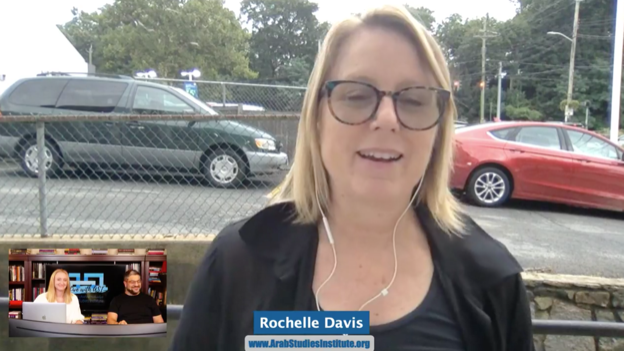
Dr. Rochelle Davis from Georgetown University’s Center for Contemporary Arab Studies (CCAS) joined the show live to discuss the history and mutual benefits of the CCAS-ASI working relationship, including the founding of the Arab Studies Journal.
- Click here to learn more about the Center for Contemporary Arab Studies
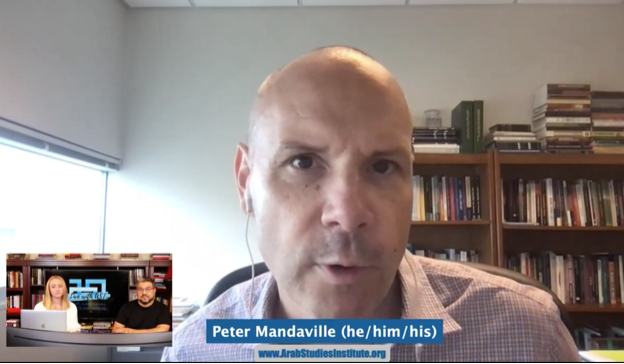
Peter Mandaville, Director of Ali Vural Ak Center for Global Islamic Studies at George Mason University, discusses the center’s partnership with MESPI to create “The Islam Module,” which is an innovative pedagogical tool to help instructure engage with productive questions related to Islam.
- Click here to learn more about the Ali Vural Ak Center for Global Islamic Studies
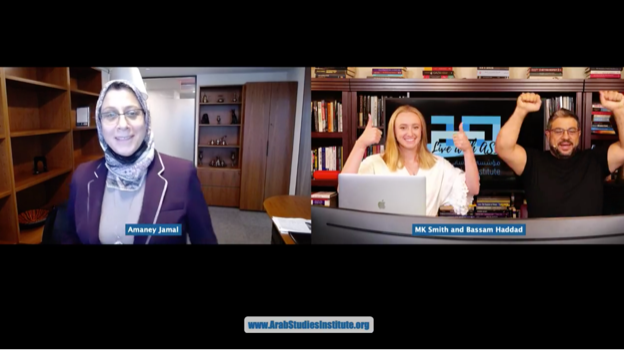
Dean Amaney Jamal of Princeton University’s School of Public and International Affairs, who is the Co-Founder and Co-Principal Investigator at the Arab Barometer, talks about the power of pulling together collective networks in order to create the Ten Years On project.
Announcement: KPP Podcast – Search Files (54:04)
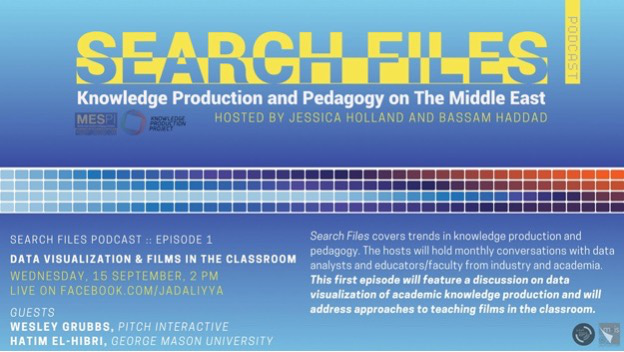
A new podcast series from the Knowledge Production Project was announced.
Search Files covers trends in knowledge production and pedagogy in the Middle East and North Africa based on a constantly evolving dataset and pedagogic research.
The KPP and Middle East Studies Pedagogy Initiative (MESPI) teams of ASI will converse with data visualization and MENAexperts, as well as educators and faculty from industry and academia. The podcast will also interview faculty as well as people behind the sceneswho gather the records that make it possible to critically analyze trends in knowledge production.
Be sure to tune in next month to hear about the first episode!
Pressing Matter (55:59)
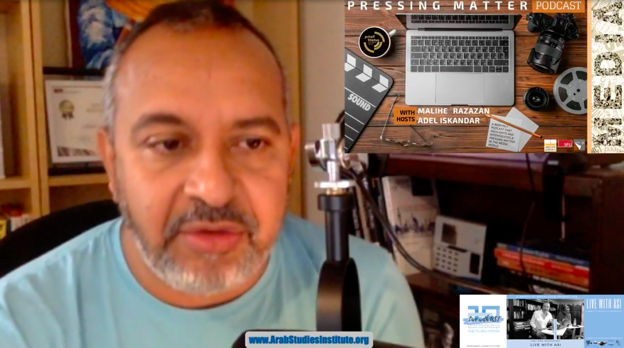
Adel Iskandar discusses the upcoming episode of the media-focused Pressing Matter podcast, which he co-hosts with Malihe Razazan. The episode takes a cue from the US withdrawal from Afghanistan and looks at post-9/11 warmongering in the media.
NEWTONS (1:01:39)
James L. Gelvin published an edited book titled, The Contemporary Middle East in an Age of Upheaval with Stanford University Press. The book addresses what has been called the “New Middle East,” which the American invasion and occupation of Iraq and the Arab uprisings of 2010-11 ushered in, and places contemporary events in the context of broader historical trends.
Laura Robson’s new book from Oxford University Press titled, “The Politics of Mass Violence in the Middle East” looks at how mass violence became a constitutive element of the state and political authority in the “Mashriq” over the course of the 20th Century.
- James L. Gelvin, ed., The Contemporary Middle East in an Age of Upheaval (New Texts Out Now)
- Laura Robson, The Politics of Mass Violence in the Middle East (New Texts Out Now)
Here are some of the other New Texts Out Now:
- Louis Yako, Bullets in Envelopes: Iraqi Academics in Exile (New Texts Out Now)
- Banu Karaca, The National Frame: Art and State Violence in Turkey and Germany (New Texts Out Now)
- Léopold Lambert, États d’urgence: Une histoire spatiale du continuum colonial français (States of Emergency: A Spatial History of the French Colonial Continuum) (New Texts Out Now)
- Hatim El-Hibri, Visions of Beirut: The Urban Life of Media Infrastructure (New Texts Out Now)
- J. Andrew Bush, Between Muslims: Religious Difference in Iraqi Kurdistan (New Texts Out Now)
- Simon Mabon, Houses built on sand: Violence, sovereignty and revolution in the Middle East (New Texts Out Now)
- Ayad Al-Ani, The Arabs from Alexander the Great until the Islamic Conquests: Orientalist Perceptions and Contemporary Conflicts (New Texts Out Now)
- Ümit Kurt, The Armenians of Aintab: Economics of Genocide in an Ottoman Province (New Texts Out Now)
- Pascal Menoret, Graveyard of Clerics: Everyday Activism in Saudi Arabia (New Texts Out Now)
- Alena Strohmaier and Angela Krewani, eds., Media and Mapping Practices in the Middle East and North Africa. Producing Space (New Texts Out Now)
- R. Shareah Taleghani, Readings in Syrian Prison Literature: The Poetics of Human Rights (New Texts Out Now)
- Catherine Z. Sameh, Axis of Hope: Iranian Women’s Rights Activism across Borders (New Texts Out Now)
- Milena B. Methodieva, Between Empire and Nation: Muslim Reform in the Balkans (New Texts Out Now)
- Banu Karaca, The National Frame: Art and State Violence in Turkey and Germany (New Texts Out Now)
Grad Student Corner (1:03:13)
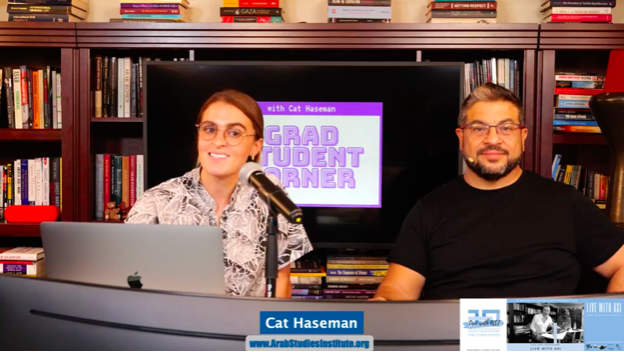
Cat Haseman highlights content produced over the summer with a special focus on considering what is most pertinent and interesting to graduate students.
In this session of the Grad Student Corner, Cat pointed students to Jadaliyya’s Maghreb Page. Over the past two months, the page has published several pieces in English and in French related to the political events unfolding in Tunisia since July 25. Cat highlighted Ouiem Chettaoui’s recent article “Tunisia: Western Pundits or “Hot-Take” Arsonists,” who challenges the reader to think about how hasty opinions and policy prescriptions promoted on the internet, especially by non-Tunisian, Western-based pundits, can influence narratives and outcomes.
- Jadaliyya Maghreb Page
- Tunisia: Western Pundits or “Hot-Take” Arsonists by Ouiem Chettaoui
Must-Reads (1:05:40)
This month’s episode of Live with ASI ended with a look at two must-read articles from Jadaliyya.
Jadaliyya Co-Editor Mouin Rabbani interviewed Hiba Zayadin, Gulf researcher at Human Rights Watch, to get a better understanding of the controversial treatment of the migrant laborers in Qatar tasked with constructing facilities for the 2022 FIFA World Cup.
July marked the fiftieth anniversary of the communist massacres in Sudan. A piece published over the summer titled “Prison Memories: Sudanese Communists and the Aftermath of July 1971 in Kober” by Shahenda Suliman, recognizes the Kober colonial prison as a site of political practice and inquiry. Its walls, Suliman writes, tell the stories of Sudanese nationalism, anti-colonialism, marxism, and political Islam.
"Reflections on the State of Democracy in Iran after the 2021 Elections: An Elegy for the Voting Non-Voter" by Shervin Malekzadeh looks at the protesting non-voters in Iran and inquires into whether Iran’s newly empowered hardliners will pursue a new social contract between state and society.

